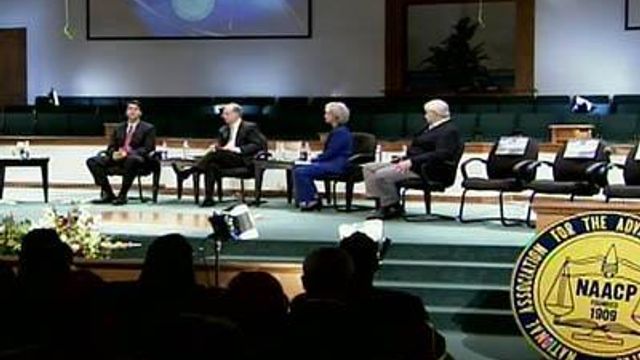Four N.C. Governor's Candidates Answer NAACP Questions in Durham
Four candidates for North Carolina governor tried to persuade black activists Saturday that they were committed to improving the well-being of all North Carolinians and had the best record on promoting racial equality.
Posted — Updated"I think we all have to challenge ourselves to continue on with [Martin Luther King Jr.'s] fight for justice and equality for all," Lt. Gov. Beverly Perdue said at the forum held at a Durham church and sponsored by the state chapter of the National Association for the Advancement of Colored People.
Some of the candidates' answers during the forum ran counter to the goals of the NAACP and representatives of liberal-leaning groups that have laid out a 14-point agenda for the state.
None of the candidates endorsed abolishing the death penalty, although they all said they were committed to reducing racial biases within the criminal justice system.
"I do believe that there is biblical evil that lives among us, and for some crimes we give up the right to be here on the earth," State Treasurer Richard Moore said in the sanctuary at Union Baptist Church. "But that penalty must be fairly implemented, and no government and no governor should sit idle thinking that that is not being done."
Moore and Perdue, the leading Democratic candidates, sat on the stage with Republican Bob Orr, a former Supreme Court justice, and another Democrat, Dennis Nielsen of Nash County.
The stage also included three empty chairs, representing Republican hopefuls Bill Graham, Pat McCrory and Fred Smith, who declined to attend the forum. Their campaigns said they had other commitments.
The forum had less of the back-and-forth between candidates seen in previous televised debates. NAACP officials said they just wanted to hear where the candidates stood on the issues, but that didn't prevent some finger-pointing.
When Orr discussed a new education initiative to consolidate power over the public schools in the governor's office, he mentioned that "only two elected officials sit on the (state) Board of Education, one to my left and one to my right," a reference to Perdue and Moore.
"Both have been there for seven years," he added. "I'm willing to make the real changes that will make a real difference in our children's lives."
Nielsen, a retired Air Force colonel making his first major debate appearance with other candidates, alluded to Perdue and Moore when he talked about candidates who had been looking into their records to criticize the other.
"The public is tired of this constant bickering between candidates and parties," Nielsen told the crowd of several hundred. "So while all of these are going to be looking into each other's pasts, I am going to be looking at your future."
Only Nielsen directly answered a question as to whether public employees should have collective bargaining rights.
North Carolina is one of two states that expressly ban state and local governments from entering into collective bargaining deals with their employees. Nielsen said he supported collective bargaining but that government workers shouldn't be able to use it to raise their wages.
Copyright 2024 by WRAL.com and the Associated Press. All rights reserved. This material may not be published, broadcast, rewritten or redistributed.





